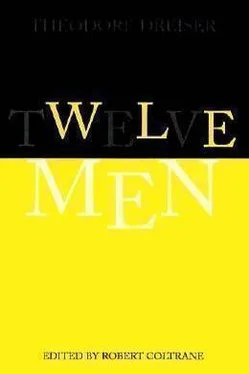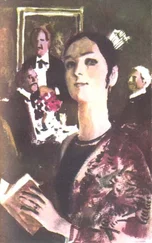Теодор Драйзер - Twelve Men
Здесь есть возможность читать онлайн «Теодор Драйзер - Twelve Men» весь текст электронной книги совершенно бесплатно (целиком полную версию без сокращений). В некоторых случаях можно слушать аудио, скачать через торрент в формате fb2 и присутствует краткое содержание. Год выпуска: 2014, Издательство: epubBooks Classics, Жанр: Биографии и Мемуары, на английском языке. Описание произведения, (предисловие) а так же отзывы посетителей доступны на портале библиотеки ЛибКат.
- Название:Twelve Men
- Автор:
- Издательство:epubBooks Classics
- Жанр:
- Год:2014
- ISBN:нет данных
- Рейтинг книги:4 / 5. Голосов: 1
-
Избранное:Добавить в избранное
- Отзывы:
-
Ваша оценка:
- 80
- 1
- 2
- 3
- 4
- 5
Twelve Men: краткое содержание, описание и аннотация
Предлагаем к чтению аннотацию, описание, краткое содержание или предисловие (зависит от того, что написал сам автор книги «Twelve Men»). Если вы не нашли необходимую информацию о книге — напишите в комментариях, мы постараемся отыскать её.
Twelve Men — читать онлайн бесплатно полную книгу (весь текст) целиком
Ниже представлен текст книги, разбитый по страницам. Система сохранения места последней прочитанной страницы, позволяет с удобством читать онлайн бесплатно книгу «Twelve Men», без необходимости каждый раз заново искать на чём Вы остановились. Поставьте закладку, и сможете в любой момент перейти на страницу, на которой закончили чтение.
Интервал:
Закладка:
"Why didn't he get up, then, do you suppose?" I now asked on my part.
"I dunno," he answered. "Guess he was too honest, maybe. It's sometimes that way in politics, you know. He was a mighty determined man, and one that would talk out in convention, whatever happened. Whenever they got to twisting things too much and doing what wasn't just honest, I suppose he'd kick out. Anyhow, he didn't get up, and I've always wondered at it."
In Danville one might hear other stories wholly bearing out this latter opinion, and always interesting—delightful, really. Thus, a long, enduring political quarrel was once generated by an incident of no great importance, save that it revealed an odd streak in the old patriarch's character and his interpretation of charity and duty.
A certain young man, well known to the people of this county and to the patriarch, came to Danville one day and either drank up or gambled away a certain sum of money intrusted to him by his aunt for disposition in an entirely different manner. When the day was all over, however, he was not too drunk to realize that he was in a rather serious predicament, and so, riding out of town, traveled a little way and then tearing his clothes and marking his skin, returned, complaining that he had been set upon by the wayside, beaten, and finally robbed. His clothes were in a fine state of dilapidation after his efforts, and even his body bore marks which amply seconded his protestation. In the slush and rain of the dark village street he was finally picked up by the county treasurer seemingly in a wretched state, and the latter, knowing the generosity of White and the fact that his door was always open to those in distress, took the young man by the arm and led him to the patriarch's door, where he personally applied for him. The old patriarch, holding a lamp over his head, finally appeared and peered outward into the darkness.
"Yes," he exclaimed, as he always did, eyeing the victim; "what is it you want of me?"
"Mr. White," said the treasurer, "it's me. I've got young Squiers here, who needs your sympathy and aid tonight. He's been beaten and robbed out here on the road while he was on his way to his mother's home."
"Who?" inquired the patriarch, stepping out on the porch and eyeing the newcomer, the while he held the lamp down so as to get a good look. "Billy Squiers!" he exclaimed when he saw who it was. "Mr. Morton, I'll not take this man into my house. I know him. He's a drunkard and a liar. No man has robbed him. This is all a pretense, and I want you to take him away from here. Put him in the hotel. I'll pay his expenses for the night, but he can't come into my home," and he retired, closing the door after him.
The treasurer fell back amazed at this onslaught, but recovered sufficiently to knock at the door once more and declare to his friend that he deemed him no Christian in taking such a stand and that true religion commanded otherwise, even though he suspected the worst. The man was injured and penniless. He even went so far as to quote the parable of the good Samaritan who passed down by way of Jericho and rescued him who had fallen among thieves. The argument had long continued into the night and rain before the old patriarch finally waved them both away.
"Don't you quote Scripture to me," he finally shouted defiantly, still holding the light and flourishing it in an oratorical sweep. "I know my Bible. There's nothing in it requiring me to shield liars and drunkards, not a bit of it," and once more he went in and closed the door.
Nevertheless the youth was housed and fed at his expense and no charge of any kind made against him, although many believed, as did Mr. White, that he was guilty of theft, whereas others of the opposing political camp believed not. However, considerable opposition, based on old Mr. White's lack of humanity in this instance, was generated by this argument, and for years he was taunted with it although he always maintained that he was justified and that the Lord did not require any such service of him.
The crowning quality of nearly all of his mercies, as one may easily see, was their humor. Even he was not unaware, in retrospect, of the figure he made at times, and would smilingly tell, under provocation, of his peculiar attitude on one occasion or another. Partially from himself, from those who saw it, and the judge presiding in the case, was the following characteristic anecdote gathered.
In the same community with him at one time lived a certain man by the name of Moore, who in his day had been an expert tobacco picker, but who later had come by an injury to his hand and so turned cobbler, and a rather helpless, although not hopeless, one at that. Mr. White had known this man from boyhood up, and had been a witness at various times to the many changes in his fortunes, from the time, for instance, when he had earned as much as several dollars a day—good pay in that region—to the hour when he took a cobbler's kit upon his back and began to eke out a bare livelihood for his old age by traveling about the countryside mending shoes. At the time under consideration, this ex–tobacco picker had degenerated into so humble a thing as Uncle Bobby Moore, a poor, half–remembered cobbler, whose earlier state but few knew, and who at this time had only a few charitably inclined friends, with some of whom he spent the more pleasant portion of the year from spring to fall. Thus, it was his custom to begin his annual pilgrimage with a visit of ten days to Mr. White, where he would sit and cobble shoes for all the members of the household. From here he would go to another acquaintance some ten miles farther on, where he could enjoy the early fruit which was then ripening in delicious quantity. Then he would visit a friendly farmer whose home was upon the Missouri River still farther away, where he did his annual fishing, and so on by slow degrees, until at last he would reach a neighborhood rich in cider presses, where he would wind up the fall, and so end his travel for the winter, beginning his peculiar round once more the following spring at the home of Mr. White. Naturally the old patriarch knew him and liked him passing well.
As he grew older, however, Uncle Bobby reached the place where even by this method and his best efforts he could scarcely make enough to sustain him in comfort during the winter season, which was one of nearly six months, free as his food and lodging occasionally were. He was too feeble. Not desiring to put himself upon any friend for more than a short visit, he finally applied to the patriarch.
"I come to you, Mr. White," he said, "because I don't think I can do for myself any longer in the winter season. My hand hurts a good deal and I get tired so easily. I want to know if you'd won't help me to get into the county farm during the winter months, anyhow. In summer I can still look out for myself, I think."
In short, he made it clear that in summer he preferred to be out so that he might visit his friends and still enjoy his declining years.
The old patriarch was visibly moved by this appeal, and seizing him by the arm and leading off toward the courthouse where the judge governing such cases was then sitting he exclaimed, "Come right down here, Uncle Bobby. I'll see what can be done about this. Your old age shouldn't be troubled in this fashion—not after all the efforts you have made to maintain yourself," and bursting in on the court a few moments later, where a trial was holding at the time, he deliberately led his charge down the aisle, disturbing the court proceedings by so doing, and calling as he came:
"Your Honor, I want you to hear this case especially. It's a very important and a very sad case, indeed."
Agape, the spectators paused to listen. The judge, an old and appreciative friend of his, turned a solemn eye upon this latest evidence of eccentricity.
Читать дальшеИнтервал:
Закладка:
Похожие книги на «Twelve Men»
Представляем Вашему вниманию похожие книги на «Twelve Men» списком для выбора. Мы отобрали схожую по названию и смыслу литературу в надежде предоставить читателям больше вариантов отыскать новые, интересные, ещё непрочитанные произведения.
Обсуждение, отзывы о книге «Twelve Men» и просто собственные мнения читателей. Оставьте ваши комментарии, напишите, что Вы думаете о произведении, его смысле или главных героях. Укажите что конкретно понравилось, а что нет, и почему Вы так считаете.









